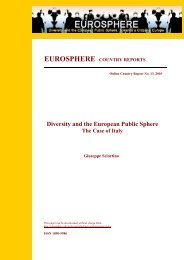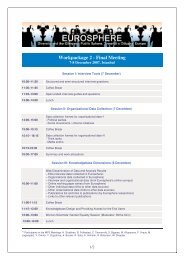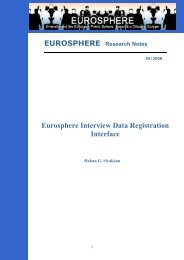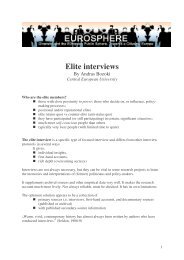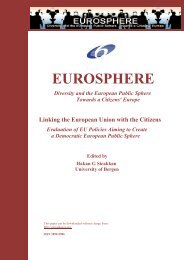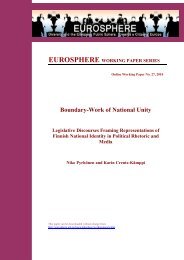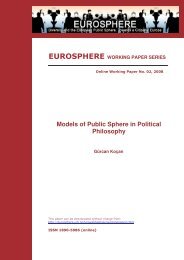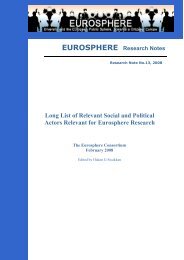Migrants, Minorities, Belongings and Citizenship. Glocalization and ...
Migrants, Minorities, Belongings and Citizenship. Glocalization and ...
Migrants, Minorities, Belongings and Citizenship. Glocalization and ...
You also want an ePaper? Increase the reach of your titles
YUMPU automatically turns print PDFs into web optimized ePapers that Google loves.
● which existing national <strong>and</strong> international institutions can continue to be democratic,<br />
inclusive <strong>and</strong> empowering within the new glocalized contexts of the European<br />
Union;<br />
● what new institutions <strong>and</strong> norms are needed for sustaining an inclusive <strong>and</strong><br />
empowering politics <strong>and</strong> a democratic society;<br />
● which supranational strategies are needed for introducing the required democratic<br />
norms <strong>and</strong> institutions in which transnational, national, regional, <strong>and</strong> glocal<br />
contexts. Concerning improvement strategies, three models will be taken as the<br />
point of departure: Functional Equivalence, Subsidiarity, <strong>and</strong> Differentiated Scale of<br />
Rights.<br />
Taken together, this should also point to some crucial areas of political contestation in<br />
the European Union, as well as provide an increased underst<strong>and</strong>ing of what a closer<br />
association to the Union will mean for some of the states yet not being members.<br />
The point of departure in Glocalmig is the conviction that the new European realities<br />
cannot be understood <strong>and</strong> described with the concepts <strong>and</strong> tools of the past. New<br />
concepts <strong>and</strong> perspectives that are based on the present reality should also be employed.<br />
Glocalmig has, therefore, set out to produce research based facts <strong>and</strong> concepts which<br />
can constitute the basis of a new European citizenship structure <strong>and</strong> a European public<br />
space. For achieving these research objectives, the Glocalmig Consortium has developed<br />
certain research tools, which are specially designed in order to address questions relating<br />
to the quality of citizenships in the contexts of diversity, mobility <strong>and</strong><br />
changing/ambigious geographical, cultural <strong>and</strong> political boundaries. Since the European<br />
Union, with its ongoing processes of integration <strong>and</strong> enlargement is one such context,<br />
these research tools are highly relevant for any research on citizenship <strong>and</strong> citizen<br />
involvement in the European Union.<br />
However, although the major aim is to develop <strong>and</strong> test the required research tools,<br />
Glocalmig has also created certain knowledge about the present state of affairs regarding<br />
the quality of citizenships in those six European countries which it focused on. This<br />
knowledge relates to the importance of the relationship between citizens’ <strong>and</strong> residents’<br />
belongings <strong>and</strong> the formal citizenship structures. What Glocalmig achieved in this respect<br />
is the discovery of the glocal spaces, which can be the prototypes of a future diverse<br />
society, <strong>and</strong>, in this respect, which can be used as an alternative model in attempts to<br />
form the new inclusive European public spaces.<br />
23



